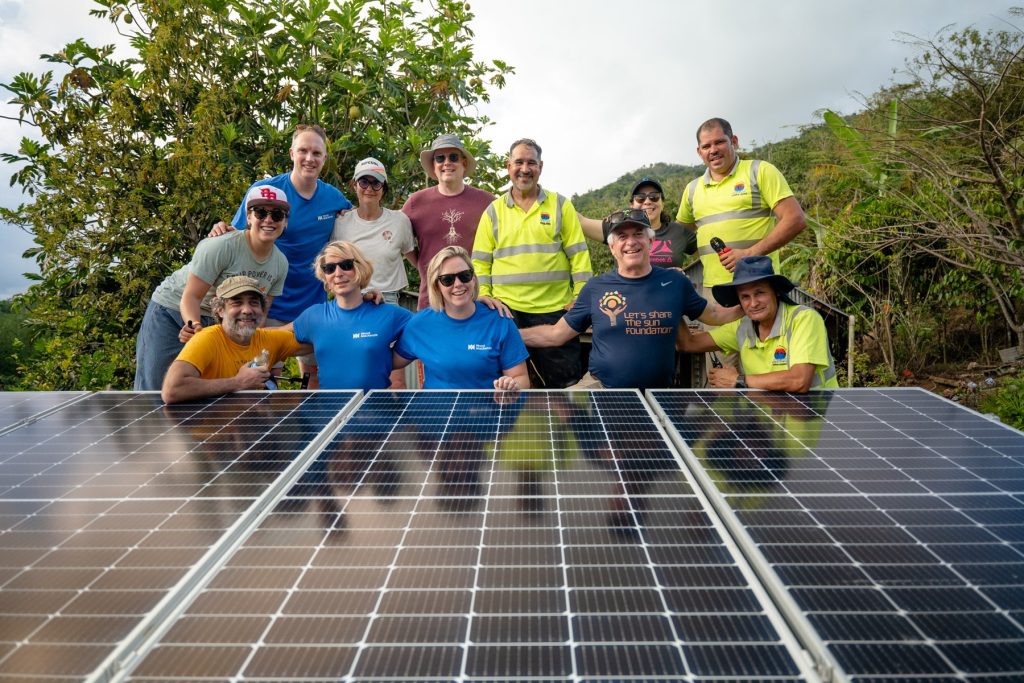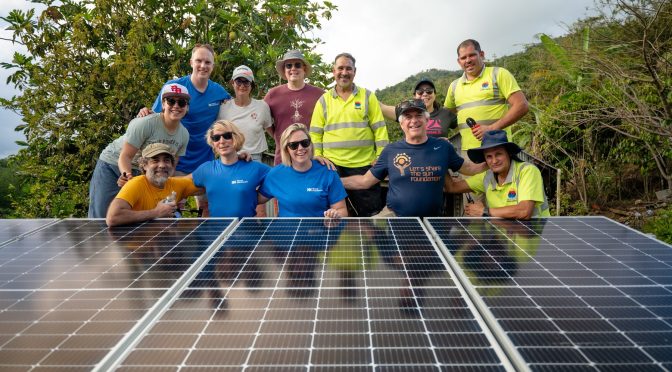In early March, a group of Wood Mackenzie volunteers spent several days in central Puerto Rico through a partnership with non-profit organisation Let’s Share the Sun. The partnership ties in directly with our internal Thrive programme, which creates a positive impact on employees and the broader community through its four pillars: community engagement, wellness, sustainability, and inclusion, diversity and belonging (ID&B).

Some of this year’s volunteers in Adjuntas, Puerto Rico
For the past three years, Wood Mackenzie has sponsored an initiative to improve energy access and energy security for at-risk individuals and families, many of whom have a critical dependency on medical devices and/or chilled medicines. This effort has supported the installation of solar PV and energy storage on more than 40 homes on an island subjected to frequent power disruptions, and long periods of complete blackout.
A lack of connectivity can make one feel very remote
It took us a while to find the road to the home of Doña Ana. She is a recent widow whose husband passed away after a five-month battle with prostate cancer; their isolation undoubtedly impacting the medical attention he received. Despite GPS coordinates and modern maps, our positioning kept jumping off route, if not vanishing from the screen. The jungle along the single-lane road of uncertain edges and questionable integrity crowded steep ascents and descents. After trial and error down several paths, and what seemed like close calls on the loose gravel road, we finally reached our destination at the end of a long mountainous road.
Doña Ana welcomed us into her home, sharing emotionally how a lack of energy access made her remote, vulnerable and often literally dark existence even more challenging. Since her husband’s passing, she has lived in fear that she will not be able to call for or receive help if she experiences a security breach, has a debilitating accident or simply needs to connect with someone to ward off loneliness.
Unfortunately, Doña Ana’s situation is not uncommon.
A lack of energy access has a disproportionate impact on women
An important paper commissioned by the European Parliament entitled Gender aspects of the rising cost of living and the impact of the energy crisis concluded that although women generally bear the brunt of inequalities in the energy sector, more needs to be done to empower women as drivers of a just energy transition.
Women are disproportionately impacted by a lack of energy access due to traditional roles of household management: meal preparation, child rearing including education, caring for elders and so on. As populations age globally, this puts additional strain on younger generations of women to care for relatives and for older women to care for spouses, or for themselves if widowed.
Energy poverty has become more acute globally due to disruptions in energy supply caused by geopolitical strife, intensifying storm systems and obsolete power infrastructure. As retail electricity prices have consequently increased, it puts at-risk homes under considerable financial stress, particularly considering recent inflationary pressures. This makes difficult decisions necessary.
Personal security can also become a critical challenge for women if a home does not have power for lighting, security systems or charged phones to call for help. This is why, for the second straight year, Wood Mackenzie has funded the installation of a solar PV array and energy storage system on a shelter for victims of domestic violence in Puerto Rico.
With the help of Let’s Share the Sun and other partners, the 25 kW-DC system installed in 2024 covers the power consumption of 100 or so residents, including children, helping to accelerate these victims to a life of normalcy.
Learn more about the importance of this project.
Full electrification of economies cannot happen without basic universal access
Efforts to electrify economies have become regular headlines in mainstream media. This drumbeat of advancements, from renewable tech to electric vehicle innovations and smart grids, is crucial to reaching net zero greenhouse gas emissions levels. As decarbonisation drives up the share of electricity in energy consumption in leading economies, attention and investment can be pulled from where the deployment of renewable technologies may be most needed.
For many people and cultures globally, there remains a pressing need simply to have access to a steady supply of energy, let alone clean power. According to projections from the IEA, at the end of 2023, the number of people without access to electricity decreased to 745 million (around 9% of the global population).
This number, however, balloons significantly if we consider those without stable access to electricity, which causes families to be subjected to brown- and blackouts, and soaring electricity prices.
Distributed solar and energy storage provide an effective solution
Existing technologies can establish better energy access. One of the main takeaways from the United Nation’s COP28 climate summit in late 2023 was the call to triple the deployment of renewable energy capacity by 2030. More than 100 countries supported this pledge, a significant response, but the details behind achievement strategies remain uncertain.
Wood Mackenzie’s latest global outlook updates for wind, solar and energy storage expect the addition of 6 TWac of renewable energy capacity from 2024 to 2033, nearly 3.5 TWac more capacity than has been cumulatively added globally prior to 2024. Most of this new capacity will be utility-scale. Although a larger share will be installed in leading markets, distributed solar will increase by 450% over the next 10 years and distributed energy storage 900%. Exciting developments indeed.
Yet, a yawning disparity between those with access to financial resources (capital, incentives and competitive loans) and those without threaten to leave a significant portion of the global population in the dark. Targeted policy support and funding mechanisms for the disadvantaged can greatly accelerate deployment of distributed energy resources like solar and energy storage. Ideally, efforts to meet the pledges from COP28 will include carveouts and/or specific incentives for people and cultures that otherwise might become unintentionally marginalised during the race to net zero.
Until effective support systems are in place, charitable solutions like the ones offered through Let’s Share the Sun are among the limited means by which people like Doña Ana can access technologies that can ameliorate often dire situations – while at the same time pushing forward a net zero agenda.
Both ends of the socio-economic spectrum need investment in renewable energy
Efforts to decarbonise at the utility and corporate levels must continue at a fast pace to have the biggest impact. Investment and support should not slow. We need those with means to innovate and pioneer new solutions, whether large-scale or at the individual level, to bring technology solutions to scale.
These efforts, however, need not be mutually exclusive from working to bring at-risk individuals and communities along on the energy transition. A more inclusive approach will yield a more equitable and sustained clean energy future. Effective policies will help ensure that the voiceless are heard and have a seat at the energy transition table.
Our partnership with Let’s Share the Sun provides perspective on the personal impact of the energy transition
Wood Mackenzie’s annual delegation consists of teammates from functions across the organisation, not just analysts involved in renewable technologies. Volunteers often remark how easy and quickly a residential solar PV array and energy storage system can be installed, with the support of local firms for the electrical work. They marvel at the simplicity of the technology, particularly in terms of its environmental, social and economic impact.
The initiative has also given the team an opportunity to experience the very personal side of the energy transition. We’ve seen firsthand how distributed solar PV and energy storage systems provide immediate safety, normalcy, economic opportunity and hope for those less advantaged. The visible expressions of joy and relief from the beneficiaries have captured our hearts. This is what motivates us to continue working to ensure that those in need have access to renewable energy technologies. It’s a fantastic way to demonstrate commitment to our mission to transform the way we power our planet
Our journey to reach Doña Ana may not have been easy, but it was worthwhile. By late afternoon we finished her system and basked together in the hot sun over her new sense of security and connectivity.
We made sure to say our goodbyes before the sun slipped behind the ridge framing Doña Ana’s house. Although the absence of streetlights meant the perils of the winding and dangerous mountain route remained, we took great pride in knowing that we had left a light – a beacon of hope for what we can accomplish together – at the end of the road.
Luke Lewandowski
Vice President, Global Renewables Research


